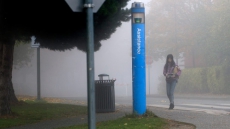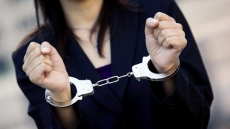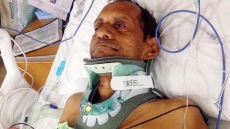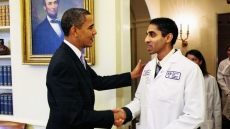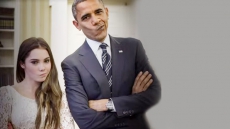OTTAWA — A senior Canadian government official says he adamantly rejects a Kurdish account of a friendly-fire incident in Iraq that saw peshmerga fighters kill one Canadian soldier and wound three others.
Sgt. Andrew Joseph Doiron was gunned down in the night-time darkness Friday when his special forces unit was surprised by a hail of gunfire from a group of their Kurdish peshmerga allies.
Kurdish officials told the Associated Press on Sunday that their soldiers opened fire on the unsuspecting Canadians after they showed up at the front line unannounced to call in airstrikes against Islamic State fighters.
Peshmerga spokesman Halgurd Hekmat blamed the Canadians for the shooting, alleging they answered in Arabic when the Kurds asked them to identify themselves. He called actions by the Canadian troops "illogical."
The claim was challenged by the Canadian government official who said "I strongly refute the narrative."
The official, who spoke on condition of anonymity, was confident the investigation into the shooting would show the Canadians were not at fault and carefully took every precaution to ensure something like this wouldn't happen.
The Canadians had been at the same position earlier in the day and informed the Kurds they would return later that night, the official said.
He added that not long before the shooting, the Canadians had met up with other peshmerga fighters close to the position where Doiron was killed. He said they also followed convention by approaching the Kurds in the exact opposite direction from the front line, where enemy ISIL groups were located.
"It's not like a Canadian soldier would be new to these Kurdish soldiers," the official said.
"For reasons unknown to us, a Kurdish soldier opened fire ... and once that one soldier opened fire, then a few more did."
He said at a certain point the Kurdish soldiers realized they were in fact engaging Canadian troops and stopped firing.
One of the wounded Canadians, he said, was evacuated to Germany to receive medical treatment and the other two were still in the Iraqi city of Irbil with more minor injuries. None of the injuries, he added, were believed to be life threatening.
The official said he expected Doiron's body to be brought back to Canada early in the week, but could not immediately provide a date and time.
Doiron's family released a statement Sunday night.
"Our son gave all and through his loss, we gave all. We've lost our beloved son and we kindly ask the media to give our family space and privacy to grieve."
The official said he was "disappointed" by the peshmerga spokesman's rush to characterize the event, but he doesn't believe the remarks or the shooting will damage the strong trust the allies have built over the last seven months.
Defence Minister Jason Kenney also took issue Sunday with the Kurdish account of events.
Kenney, appearing Sunday on both CTV's Question Period and Global Television's The West Block, said Canadian commanders in the field believe special forces soldiers approached the situation in the correct manner. But he stressed the importance of waiting for the findings of the investigation.
"We would ask that our allies in the peshmerga militia to wait until there is an investigation," Kenney said in his Global interview.
"We can sit down and compare notes to see exactly what happened. We don't think it's helpful to be talking about speculation in public on these matters."
Kenney called the shooting a tragic case of mistaken identity.
The episode has added fuel to a heated political debate in Canada over the future of the military's mission to train fighters in Iraq. The Harper government is mulling whether to extend the campaign, which is due to expire at the end of the month.
When the military deployed about 69 special forces soldiers to Iraq last fall, the government emphasized they would be serving as trainers and stationed far from the front lines. At the time, Prime Minister Stephen Harper warned there would be risks.
But in January the public learned the mission had evolved.
The troops had been accompanying Kurdish fighters to forward outposts, where they had been involved in three firefights with extremists. It was also revealed the Canadians were guiding coalition airstrikes by "painting" enemy positions with pointers for the laser-guided bombs.
NDP foreign affairs critic Paul Dewar criticized the Conservative government Sunday for not providing enough details on the exact mandate of Canadian troops in Iraq.
"At the end of the day, it's politicians that send soldiers into the theatre of war and they're the ones who should be accountable," Dewar said.
Follow @AndyBlatchford on Twitter
